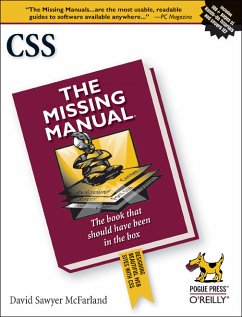Web site design has grown up. Unlike the old days, when designers cobbled together
chunky HTML, bandwidth-hogging graphics, and a prayer to make their sites look good,
Cascading Style Sheets (CSS) now lets your inner designer come out and play. But CSS
isn't just a tool to pretty up your site; it's a reliable method for handling all
kinds of presentation--from fonts and colors to page layout. CSS: The Missing
Manual clearly explains this powerful design language and how you can use it to
build sparklingly new Web sites or refurbish old sites that are ready for an upgrade.
Like their counterparts in print page-layout programs, style sheets allow
designers to apply typographic styles, graphic enhancements, and precise layout
instructions to elements on a Web page. Unfortunately, due to CSS's complexity and
the many challenges of building pages that work in all Web browsers, most Web authors
treat CSS as a kind of window-dressing to spruce up the appearance of their sites.
Integrating CSS with a site's underlying HTML is hard work, and often frustratingly
complicated. As a result many of the most powerful features of CSS are left untapped.
With this book, beginners and Web-building veterans alike can learn how to navigate
the ins-and-outs of CSS and take complete control over their Web pages'
appearance.
Author David McFarland (the bestselling author of O'Reilly's Dreamweaver: The
Missing Manual) combines crystal-clear explanations, real-world examples, a dash
of humor, and dozens of step-by-step tutorials to show you ways to design sites with
CSS that work consistently across browsers. You'll learn how to:
* Create HTML that's simpler, uses less code, is search-engine friendly, and
works well with CSS
* Style text by changing fonts, colors, font sizes, and adding borders
* Turn simple HTML links into complex and attractive navigation bars-complete
with CSS-only rollover effects that add interactivity to your Web pages
* Style images to create effective photo galleries and special effects like
CSS-based drop shadows
* Make HTML forms look great without a lot of messy HTML
* Overcome the most hair-pulling browser bugs so your Web pages work consistently
from browser to browser
* Create complex layouts using CSS, including multi-column designs that don't
require using old techniques like HTML tables
* Style Web pages for printing
Unlike competing books, this Missing Manual doesn't assume that everyone in the
world only surfs the Web with Microsoft's Internet Explorer; our book provides
support for all major Web browsers and is one of the first books to thoroughly
document the newly expanded CSS support in IE7, currently in beta release.
Want to learn how to turn humdrum Web sites into destinations that will capture
viewers and keep them longer? Pick up CSS: The Missing Manual and learn the
real magic of this tool.
chunky HTML, bandwidth-hogging graphics, and a prayer to make their sites look good,
Cascading Style Sheets (CSS) now lets your inner designer come out and play. But CSS
isn't just a tool to pretty up your site; it's a reliable method for handling all
kinds of presentation--from fonts and colors to page layout. CSS: The Missing
Manual clearly explains this powerful design language and how you can use it to
build sparklingly new Web sites or refurbish old sites that are ready for an upgrade.
Like their counterparts in print page-layout programs, style sheets allow
designers to apply typographic styles, graphic enhancements, and precise layout
instructions to elements on a Web page. Unfortunately, due to CSS's complexity and
the many challenges of building pages that work in all Web browsers, most Web authors
treat CSS as a kind of window-dressing to spruce up the appearance of their sites.
Integrating CSS with a site's underlying HTML is hard work, and often frustratingly
complicated. As a result many of the most powerful features of CSS are left untapped.
With this book, beginners and Web-building veterans alike can learn how to navigate
the ins-and-outs of CSS and take complete control over their Web pages'
appearance.
Author David McFarland (the bestselling author of O'Reilly's Dreamweaver: The
Missing Manual) combines crystal-clear explanations, real-world examples, a dash
of humor, and dozens of step-by-step tutorials to show you ways to design sites with
CSS that work consistently across browsers. You'll learn how to:
* Create HTML that's simpler, uses less code, is search-engine friendly, and
works well with CSS
* Style text by changing fonts, colors, font sizes, and adding borders
* Turn simple HTML links into complex and attractive navigation bars-complete
with CSS-only rollover effects that add interactivity to your Web pages
* Style images to create effective photo galleries and special effects like
CSS-based drop shadows
* Make HTML forms look great without a lot of messy HTML
* Overcome the most hair-pulling browser bugs so your Web pages work consistently
from browser to browser
* Create complex layouts using CSS, including multi-column designs that don't
require using old techniques like HTML tables
* Style Web pages for printing
Unlike competing books, this Missing Manual doesn't assume that everyone in the
world only surfs the Web with Microsoft's Internet Explorer; our book provides
support for all major Web browsers and is one of the first books to thoroughly
document the newly expanded CSS support in IE7, currently in beta release.
Want to learn how to turn humdrum Web sites into destinations that will capture
viewers and keep them longer? Pick up CSS: The Missing Manual and learn the
real magic of this tool.
Es gelten unsere Allgemeinen Geschäftsbedingungen: www.buecher.de/agb
Impressum
www.buecher.de ist ein Internetauftritt der buecher.de internetstores GmbH
Geschäftsführung: Monica Sawhney | Roland Kölbl | Günter Hilger
Sitz der Gesellschaft: Batheyer Straße 115 - 117, 58099 Hagen
Postanschrift: Bürgermeister-Wegele-Str. 12, 86167 Augsburg
Amtsgericht Hagen HRB 13257
Steuernummer: 321/5800/1497
